- Home
- Steve Hockensmith
Dreadfully Ever After Page 13
Dreadfully Ever After Read online
Page 13
“No. I don’t.”
“Good. So it wasn’t just me.”
Darcy looked into his cousin’s eyes as the two of them kept walking side by side. Night had fallen, yet he could see Anne more clearly—and pick his way through the forest with more ease, it seemed—than when the sun had been shining down through the trees.
Before he could speak again, a loud thumping sound drew Anne’s attention, and he followed her gaze to find a hazy radiance moving toward them. As it neared, it grew sharper, gained definition, until Darcy could see his aunt riding toward them on one of her enormous Scottish-bred chargers. To his eyes, both glowed with a dull light that cast no shadow, and he found himself wishing to bask in it, bathe in it, wallow in a warmth that wasn’t even there.
Lady Catherine stopped her horse before them. Her mount seemed nervous, stamping its heavy hooves and dancing in a semicircle. As its great haunches turned, Darcy could see a cluster of oval shapes strung to its side like an enormous bunch of grapes.
Anne stiffened beside him.
The shapes were freshly severed heads. Darcy recognized among them the puffy black face of the putrid unmentionable that had tried a taste of him not a quarter hour before.
“What do you think you’re doing?” Lady Catherine snapped. “You know it’s dangerous out here this time of year.”
She was looking at her daughter.
“Oh, there was nothing to worry about. We were perfectly safe. Weren’t we, Fitzwilliam?”
She wrapped her arm around Darcy’s.
“Yes,” he heard himself say. “Perfectly.”
Her Ladyship kept her gaze on Anne. “Your cousin is not well. It is foolish to take him so far from the house.”
“DARCY COULD SEE A CLUSTER OF OVAL SHAPES STRUNG TO ITS SIDE LIKE AN ENORMOUS BUNCH OF GRAPES. THE SHAPES WERE FRESHLY SEVERED HEADS.”
So far from me, Darcy suspected she really meant.
“It seems to me,” Anne replied, “that Fitzwilliam will end up going further faster if he is not limited to the confines—and the close company—of Rosings. A little more fresh air and freedom, and who knows how quickly he might come ’round as we’d like?”
Lady Catherine narrowed her eyes and jutted out her jaw and flared her nostrils. It was a look Darcy knew well. He’d seen battle-hardened soldiers wither under it like an ant burned by the hot focused light of a magnifying glass. He’d only been its locus a few unhappy times in his life; he’d never seen it pointed at Anne. To his surprise, she withstood it without blinking or looking away.
“I will see you back at the house for supper,” Lady Catherine said. “Don’t dawdle. Kochi is laying out eel from the Great Stour, and you know how much better that is when it’s fresh.”
She wheeled her stallion around and galloped off, the heads tied to the horse’s flank clunking against each other like muffled castanets.
“I’ve never stood up to her before,” Anne said. “Not about anything.” She squeezed Darcy’s arm. “I think I’m the one growing stronger now … thanks to you. You’re the only one of us who ever dared defy her.”
“It was not something I took pleasure in doing.”
“Yet you did it all the same, because you felt you had to. I wonder if I would have passed the test as you did.” Anne stared off into the shadows that had quickly swallowed up her mother. “Perhaps someday we will find out.”
She looked back up into Darcy’s eyes and smiled in a way that was somehow warm and cold at the same time, like a sip of chilled sake. Then she started toward the house, still latched to his side.
In the dining room, they found Lady Catherine already sitting stiffly at the head of the table while Kochi, her favorite sushi chef (for the moment), stood ready at his work table nearby. At the man’s feet was a bucket of churning water. Kochi greeted the newcomers with a bow and then plunged a hand into the bucket, plucking out a furiously squirming black eel. Within seconds, it was slapped onto a cutting board, beheaded, sliced into slivers, and presented to the dinner party on small mounds of white rice.
Kochi stood stiffly beside Her Ladyship as she took her first bite. The man did his best not to look like he was bracing for an elbow to what was once known—before the term was appropriated for something deemed even more horrifying—as his unmentionables. If his sashimi didn’t rise to the heights his mistress demanded, he would know quickly. And painfully.
“The unagi is …,” Lady Catherine began in Japanese.
Kochi fought to keep his hands at his sides, but Darcy could see them inching together involuntarily, creeping toward those appendages he might soon be clutching in agony.
“… acceptable.”
Kochi let out a deep breath, bowed again, and scurried back to his work station.
Darcy already had a piece of glistening red eel meat pinched in his chopsticks, and now that his aunt had pronounced judgment, he was free to take a bite.
He’d never eaten sawdust, but now he felt he might as well have. He could barely keep himself from retching on the glob of flavorless paste he found himself chewing.
And then, an explosion of not just flavor but warmth radiated from his mouth to the whole of his being. It was the accursed rice! It had blunted the taste of the fish. Now the juices were reaching his tongue, and the little brick of fresh thick-cut flesh was tearing apart between his teeth. With each bite, he could taste more of not just the fish but its strength, its drive to hunt and kill and spread its seed, the riverbed it had been slithering along not long before. Its very life.
Darcy felt almost woozy with pleasure, and his eyes rolled back in his head. He became aware of a guttural groaning that grew louder with each chew.
Then he realized it was coming from him.
He blinked and swallowed and peeped over at his aunt and cousin to see if they’d noticed. He found them staring back, Lady Catherine looking revolted, Anne seemingly stifling a laugh.
“Don’t worry,” Darcy said, dabbing at his face with a napkin. A thin trickle—he could only hope it wasn’t drool—had escaped his mouth and run down his chin. “I shan’t be yanking fish from Kochi’s bucket and gobbling them down whole.”
“You may if you like,” Anne said. She turned to her mother, grinning. “Isn’t that right?”
Lady Catherine was not amused.
“On second thought,” the old woman said gravely, “there is a mealiness to this eel. You must be more careful when cutting against the grain, Kochi. I can only hope the next piece is more satisfying.”
Kochi went as white as his spotless chef’s smock.
Darcy picked up another piece of sashimi with his chopsticks but set it back down again. The next time he took a bite, he wanted to be ready. He distracted himself from the thwarted rumbling of his stomach with the question he asked his aunt every night around this time.
“Any word from Derbyshire?”
He got the same answer as always: “No” and a quick change of subject. (“I can taste the vinegar in the rice, Kochi. You know I don’t like that. Come here.”)
There was something different about this latest “No,” however. It came out as blunt and brusque as always, yet Lady Catherine’s gaze never met his. Instead, it jerked toward Anne. As the two women looked into each other’s eyes for all of a second, Darcy could sense a change in them he couldn’t put a name to. It was as if the light he sometimes saw in living things flared for a moment. Then Lady Catherine was turning her attention to Kochi, and the moment passed.
Darcy had suspected, and now he knew, though he couldn’t explain how. Something was being kept from him. Something to do with Derbyshire—and Elizabeth.
There was a yelp from the head of the table, followed by the sound of a man falling to his knees while gasping out apologies in Japanese. Yet Darcy didn’t even notice. He was carefully peeling a lump of eel from its bed of rice even as he began planning how to strip away the secrecy that surrounded him.
He was weakened, unsteady, confused. Yet he was still enough o
f his old self to get to the truth. Or so he had to hope.
He popped the raw meat into his mouth and tried very, very hard not to moan.
CHAPTER 21
If someone had described Section Twelve Central as “hell” that afternoon, Mary could not have disagreed. Now that it was night, however, she was discovering an unpleasant truth: Even hell can get worse.
Her dealings at Bethlem had been brief yet promising, and afterward she’d lingered a while nearby, observing the comings and goings of the hospital staff. Nezu had suggested the place was heavily guarded, but the wooden watch towers at each corner of the grounds stood empty, and the only sentry was a jumpy old man at the front gate. Mary was hoping Sir Angus would drop in for an evening inspection (or whatever it is “administrators” do): If he did, she would accelerate her plan and follow him inside. Somehow. Yet he never arrived, and when at last it became too dark to see anything of Bethlem but candlelight shimmering dimly through a few barred windows, Mary started back toward One North—and began her second tour of Twelve Central.
As earlier, the streets were lined with bodies awaiting collection. With the corpse wagons gone till dawn, the piles were all the higher, and more of their jaundiced contents had begun to twitch and groan. Here and there, small groups of men attended to the newly awakened with Zed rods, and the cobblestones were slick with pulped brain glistening in the moonlight. For the most part, however, the living of Twelve Central had retreated into their filthy gin shops and tenements, and more than one leaned out an upper-story window to offer commentary as she passed below.
“Ooooo! Looks like a do-gooder went and stayed too long amongst the unwashed. I do hope she’s alive in the morning to bring us back more alms!”
“Could you tell the soldiers to pop ’round on your way out, Your Highness? I’ve a dead chimney sweep stuck up my flue, and he’s starting to make an awful fuss.”
“You don’t want to be out on them streets alone, Milady. Why not come up ’ere and spend the night safe an’ sound with ol’ Bill?”
Sometimes all Mary heard was a hiss or growl from the shadows, as if even the dreadfuls were heckling her. Yet despite the ghastliness all around, she walked on unafraid. It wasn’t just because she had supreme confidence in her own abilities—though that she did. She also knew she wasn’t alone. She had an escort, as she had on her way to Bethlem Hospital hours before. There would be a difference this time, though: Soon, she would know who that escort was.
Ambushes weren’t really Mary’s specialty. If she’d had one before then, it was noting the errors of others. Now, however, she intended to learn from her own experience.
She turned a corner and dodged a few steps down an especially narrow alley, much like the one in which she’d been waylaid earlier that day. Then she stopped and waited.
Within seconds, she heard the pitter-pat of clawed paws on pavement and the soft hum of well-oiled wheels. Both sounds grew louder, louder—and then broke off abruptly just as they seemed to be reaching a crescendo.
Years before, at Shaolin Temple, Master Liu had taught her to track the passage of a cockroach across the floor with a blindfold over her eyes and straw stuffed in her ears. So while the dogs were obviously well trained—there was no whining or whimpering, no fidgeting, no scratching at fleas—she could still hear their shallow pants as clearly as the ringing chimes of a London church bell.
“You can pretend you’re not there, and I can pretend I’m not here, but there’s really no point in it, is there?” Mary said. “Here we are, so we might as well acknowledge each other. At any rate, I merely wish to thank you.”
A dark snout slowly poked around the corner and took a tentative sniff before the rest of its face followed. It was by no means a pretty dog: The wiry hair was patchy, half of one ear had been sheared off clean, and a pink scar ran across its forehead. It inspected Mary with such wary intelligence, however, she almost expected it to speak.
Which, in a way, it did. The dog chuffed out a single, gruff, breathy sound—more than a snarl, less than a bark—and a moment later Mary heard the squeak of leather. Reins were being loosened.
The dog stepped into the alley with another, even scruffier dog at its side. With them came the small, black, coffinlike crate to which they were tethered.
“Why should you thank me?” said the Man in the Box.
He had a hoarse, gravely voice, yet underlying it was both a softness and a vitality. Whatever had happened to his throat (and the rest of him), he wasn’t old. Mary peered at the narrow slit that ran across the front of his little enclosed carriage, hoping for a glimpse of his eyes, but all she saw was darkness.
“You’ve been of such service to me today,” she said. “Sending your friends to help when I was delayed by those ruffians; escorting me back to One North now; seeing to it that the guards at the gate from Eleven Central let me pass on my way in. That last is an assumption, by the way. Please correct me if it is in error.”
The Man in the Box said nothing.
“Would you mind explaining why you’ve been helping me?” Mary asked him.
There was more silence. Then, eventually, “Yes.”
“Then I shall have to do more assuming. You are another agent of Lady Catherine, like Nezu, and have been tasked with aiding my family in its undertaking here in London.”
There was a raspy sound within the box—perhaps a husky sigh.
“You are as skilled with your assumptions as you are in the deadly arts,” the Man croaked. “You have the gist of things, if not all the particulars.”
One of the dogs—the one with the scar—perked up its ears and stared off into the blackness of the alleyway. The other dog quickly followed suit.
Mary heard footsteps shuffling somewhere far behind her, though not as far as she would have liked.
“Perhaps we should move on together,” she said.
She didn’t wait for the Man to agree. She simply started walking. Soon enough, the dogs joined her, bringing their master with them.
“As much as I respect your abilities,” the Man said, “I was about to suggest moving along myself. I have never seen Twelve Central so bad, and it is always abysmal. Even as seasoned a warrior as you might find herself inconvenienced.”
Mary felt an unaccustomed warmth rise to her cheeks. She resented it the second she realized what it was.
It wasn’t often—never, in fact—that anyone paid her a compliment. And this was a Man in a Box, not a Woman. And a Young Man at that.
Still, though … “in a Box”! And why should she care what any man, boxed or unboxed, thought of her?
So she did the English thing. She changed the subject.
“It is quite clever how you’ve trained your dogs. It reminds me of an army officer I once knew who was similarly unable to autolocomote. He got around with the help of two soldiers and a wheelbarrow.”
“Such a man was my inspiration. Only I, of course, have no privates at my command.”
“You have no—? Ah! Yes, of course! I see what you mean.”
Mary coughed, her cheeks not tingling now but burning. She found herself so desperate to change the subject (again) that she committed the sin she most frequently accused her sister Kitty of: lack of tact.
“Was it the dreadfuls who rendered you thus?”
“Oh, goodness, no. I cut myself shaving.”
A long moment passed in silence.
“You are being facetious,” Mary finally said.
“Indeed. I hope you will forgive me. It is a bad habit I have acquired in recent years. Since being rendered thus, you understand.”
“Now you mock me.”
“No, Miss Bennet. I tease you. There is a significant difference.”
“There is?”
Mary resolved to look it up when she got back to the house, assuming she could find a copy of Dr. Johnson’s dictionary. It seemed to her that she’d been mocked, teased, jeered, derided, scorned, disdained, and pooh-poohed her entire life, yet she’d
never paused to separate one from the other or gradate them in any way.
A scream cut through the night, ending in the kind of choked gurgle that could mean only one thing: somewhere nearby was at least one happy zombie.
The dogs picked up their pace. Since the party was still more than a quarter mile from the gate to Eleven Central, Mary was in complete agreement with her canine companions.
She started walking faster, too.
“I am shocked to find any part of London in such a state,” she said. “I am not often in the city and don’t know it well, I admit, but never would I have imagined the dreadfuls could have such a toehold within the Great Wall.”
“London is walls within walls. A city of boxes. A person can stay safely in one and never fear—or know—what’s in the next. Or so those in the snuggest of such boxes like to think. It is my experience that what one hopes to lock away in a box will not be content to stay there if it has any kind of life left. Even the dead kind.”
The more the Man spoke, the more Mary began to find his throaty, warbly voice less grating than … textured. Even pleasingly so.
“You are quite the philosopher,” she said.
“I have much time to think. For instance, this afternoon I had hours to ponder upon you and your journey to Bethlem Hospital. You set off for Twelve Central only after Nezu and your father and sisters had left the house. No one escorted you, you did not seem to know your way, and Nezu had made no arrangements for you to pass through the gate from One North. I could reach but one conclusion: You came of your own volition, without the permission or even the knowledge of Nezu or your family.”
“And you disapprove?”
“Not at all. I applaud your nerve. Metaphorically, of course. Courage is the trait I have always admired most in your … sort.”
“My sort?”
“Warriors, I mean. True warriors. Those with not just the skills to deal death but the fortitude to face it unafraid.”
“You would pronounce me to be such a person after just one afternoon’s observation?”

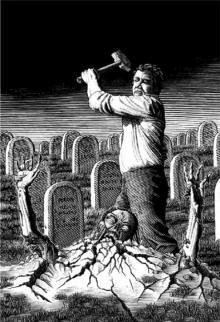 Dawn of the Dreadfuls
Dawn of the Dreadfuls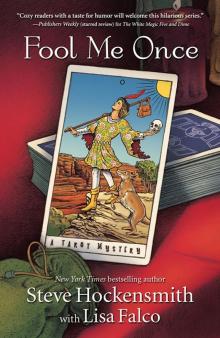 Fool Me Once: A Tarot Mystery
Fool Me Once: A Tarot Mystery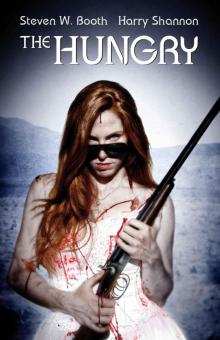 The Hungry
The Hungry Naughty: Nine Tales of Christmas Crime
Naughty: Nine Tales of Christmas Crime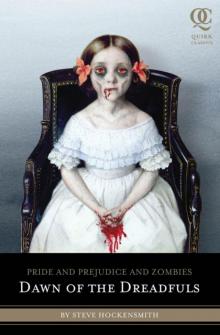 Pride and Prejudice and Zombies: Dawn of the Dreadfuls papaz-1
Pride and Prejudice and Zombies: Dawn of the Dreadfuls papaz-1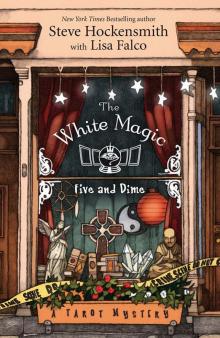 The White Magic Five & Dime (A Tarot Mystery)
The White Magic Five & Dime (A Tarot Mystery)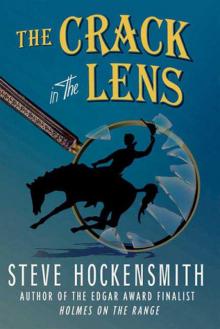 The Crack in the Lens
The Crack in the Lens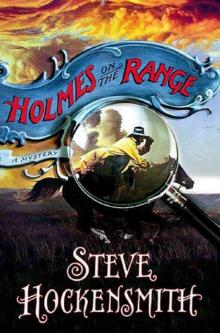 Holmes on the Range
Holmes on the Range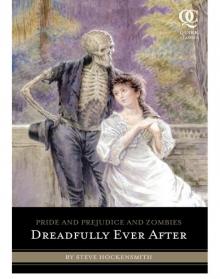 Dreadfully Ever After
Dreadfully Ever After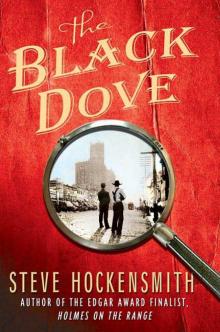 S Hockensmith - H03 - The Black Dove
S Hockensmith - H03 - The Black Dove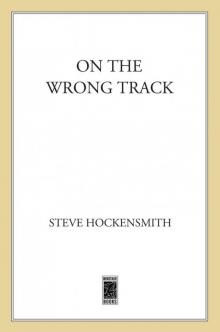 On the Wrong Track
On the Wrong Track Naughty-Nine Tales of Christmas
Naughty-Nine Tales of Christmas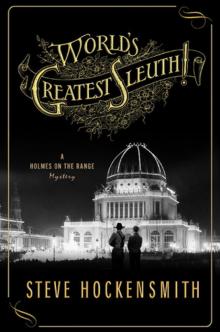 World's Greatest Sleuth!
World's Greatest Sleuth!